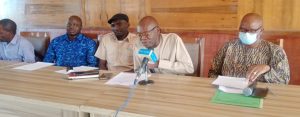The Bauchi Zone of the Academic Staff Union of Universities (ASUU) has said that the attitude of the Federal Government towards the implementation of the 2009 agreement with ASUU is forcing its members to embark on an indefinite strike.
The Zonal Coordinator, Prof. Lawan Abubakar, said this at a press conference on Tuesday in Jos, Plateau State.
The union had on November 14, issued a three-week ultimatum to the government to do the needful or face an indefinite strike.
Abubakar, represented by his immediate past predecessor, Prof. Nanmwa Voncir, said that the agreement was renegotiated in May 2020, yet the government has remained adamant about implementing it.
The coordinator advised the Federal Government to implement the 2009 agreement it entered into with the union to avert a strike by its members.
Abubakar said that the lackadaisical attitude of the government towards addressing its demands will force the union to take drastic decisions.
He explained that the demands of the union are not personal, but aimed at lifting the standard of university education in the country.
“The Bauchi zone of ASUU feels that the government has been tolerated enough and we cannot continue to entertain its officials who are failing to do the needful for over the years.
“Impending strike action can be avoided if government officials can do what they failed to do in the last one year.
“We are, once again, pained to bring these issues to the public domain because more than a year after suspending the 2020 strike, little progress has been made towards implementation.
“We are also pained to inform the public that ASUU has activated its process of resuming the conditionally suspended strike immediately after the expiration of the three-week ultimatum.
“Should we embark on strike, know that we are forced and government should be held responsible and accountable,” he said.
Abubakar, who decried the sorry state of public universities in Nigeria, called on parents, students, and the general public to continue to understand and support the union in its bid to regain the lost glory of public universities in Nigeria.
“These universities are public properties; and as stakeholders in the Nigerian project, we have a role to play regaining its lost glory.
“Today, our public universities don’t have infrastructures; our laboratories and other facilities are obsolete.
“We are pretending to be teaching and the students are pretending to be learning,” he said.

